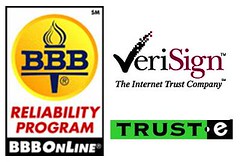Safe Online Shopping

Since online shopping has come into existence, I jumped on the bandwagon right away and marked my beginnings of e-commerce participation. It’s so convenient to find just about anything I’m looking for, especially if I’m particular about the specific brand and model of the product. I usually find whatever-it-is, instantly without having to comb through a store’s shelves. Especially during this time of year, this saves me time and the headaches of crowds and fighting for parking. Although Internet shopping has its many advantages, there are some things you should keep in mind to protect yourself. To some of you these are just common sense things you probably already know, but to others this is whole Internet shopping thing just scares you, and it’s a brand new concept that you might not even want to attempt. As long as you’re cautious, it’s perfectly safe.
One of the first things you should do is make sure the websites you shop at are secure. A secure site uses encryption to transfer information from your computer to an online merchant. The encryption scrambles the information you send (i.e. credit card number) to prevent hackers from intercepting it. The sole people who can unscramble the code are those with legitimate access rights. You can tell you’re on a secure site when you see “https://” before the “www” portion of the web address. The “s” indicates the website is secure. Sometimes you will not see the “s” until you hit the actual order page. A second thing you can look for is a closed padlock displayed at the bottom of your screen. If you see the lock open, assume it’s not secure. A third indication you’ll see is an unbroken key. This ensures the site is secure.
You should always research the website you’re ordering from. It’s wise for you to purchase from companies that you’re already familiar with. Reliable companies will usually advertise their physical address and phone number you can call to ask questions. If you call, you should ask how they handle returned merchandise, complaints and how refunds are handled (if they’ll give you a full refund or store credits).
Be sure to read over the website’s privacy and security policies. All reputable e-commerce websites offer information about how your order is processed. It’s usually listed in the website’s “Privacy Policy” section. There you can find out if the merchant intends to share your information with third parties. Look for members of a seal-of-approval program. Three of the main ones are TRUSTe (www.truste.org), Verisign (www.verisign.com) or BBBonline (www.bbbonline.org).
Often times companies will try to obtain more information about you in addition to your name, address and phone number. Sometimes they’ll also ask for more information for their marketing purposes (i.e. hobbies, buying habits, etc.). Always provide them just the minimum, and under no circumstance, never EVER give out your social security number. There is no need for any merchant to ask for this. You only need to disclose the bare facts when you order.
To avoid becoming a victim of any phishing or spoofing (where consumers receive messages from dishonest sources disguised as messages from trusted sources), make sure you check the website to make sure it’s the correct company. Don’t click on any embedded link within a suspicious e-mail. In fact, I don’t click any links. To be extra cautious, I usually open a new window and manually type in the web address, even if it’s from a trusted source.
If you use your credit card to order, that’s the safest thing to do. If something should go wrong, you are protected under the federal Fair Credit Billing Act. You have the right to dispute charges on your credit card, and can withhold your payments during a creditor investigation. Make sure your credit card is a true credit card and not a debit, check or ATM card. These will expose your precious bank account to e-thieves, and are not protected by federal law to the extent that credit cards are.
Shopping with companies located in the United States will protect you from state and federal consumer laws. You will not receive this same protection if you place an order from a company located in another country. Additionally, being out here in Hawaii, you know that we can potentially rack up huge shipping fees. Try to choose a retailer that offers free shipping. This time of year, that’s not too difficult to find since many companies offer free shipping promos to lure online shoppers in, plus you can save yourself a little dough on no tax.
Before you start filling your virtual cart up with goodies make sure you consider the things mentioned above. For more information, check out www.onguardonline.gov (Federal Trade Commission), www.safeshopping.org (American Bar Association) or www.wiredsafety.org (online safety / help group). Happy e-shopping!


0 Comments:
Post a Comment
<< Home